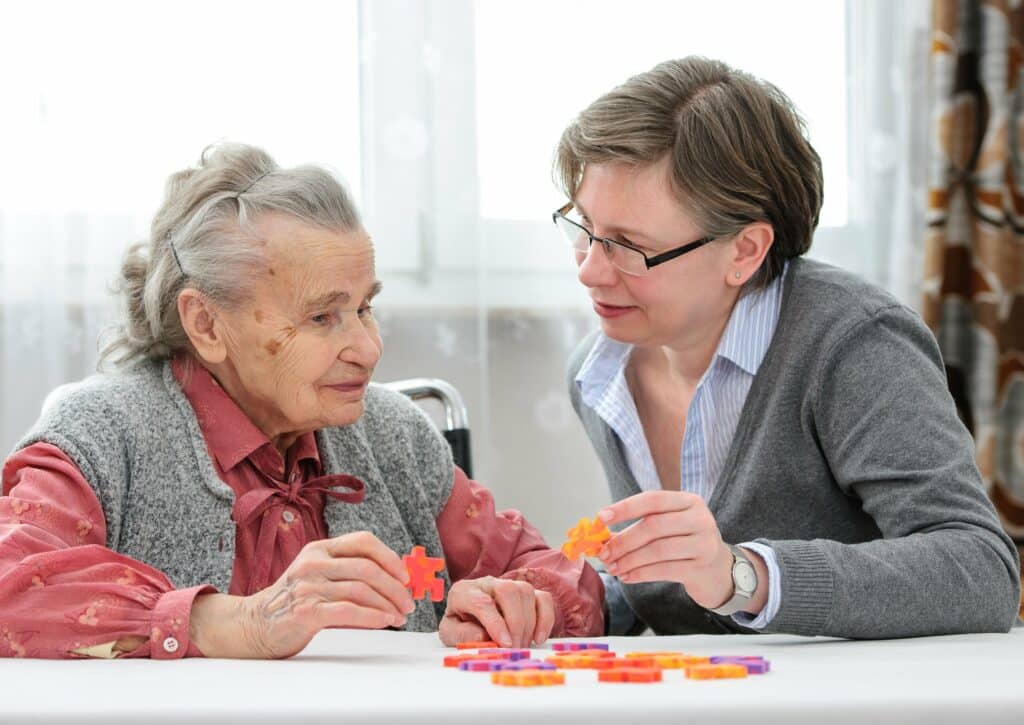Dementia is a term that encompasses a variety of cognitive disorders that affect memory, thinking, and behaviour making daily activities increasingly challenging.
With several different types of dementia, understanding the distinctions between them is crucial for accurate diagnosis, treatment, and support. In this comprehensive guide, we explore the various forms of dementia, their prevalence, symptoms, diagnosis, home care, and impact on communication, families, and the brain.
What are the different types of dementia?
Dementia isn’t a singular disease, but rather a collection of symptoms caused by various underlying conditions. Some of the most common types of dementia include:
- Alzheimer’s Disease: The most common form of dementia, accounting for 60-80% of cases, by a progressive decline in cognitive abilities.
- Vascular Dementia: Ranking as the second most prevalent form, this form of dementia results from diminished blood circulation in the brain. Vascular dementia usually occurs after a stroke or multiple minor strokes.
- Lewy Body Dementia: Associated with abnormal protein deposits (Lewy bodies) in the brain, leading to cognitive and motor difficulties.
- Frontotemporal Dementia: A group of disorders impacting the frontal and temporal lobe of an area of the brain, causing changes in personality, behaviour and language.
- Mixed Dementia: A combination of two or more types of dementia occurring simultaneously.
How many different types of dementia are there?
While the forms of dementia above are the most common, there are other lesser known types, including
- Parkinson’s Disease dementia: A cognitive decline in individuals with Parkinson’s disease.
- Huntington’s Disease: A genetic disorder causing the progressive breakdown of nerve cells in the brain. Normal Pressure
- Hydrocephalus: A buildup of cerebrospinal fluid in the brain, leading to memory loss and difficulty walking.
- Wernicke-Korsakoff Syndrome: A deficiency in vitamin B-1, typically resulting from chronic alcohol misuse, which causes severe memory problems.
- Creutzfeldt-Jakob disease: A rare degenerative brain disorder caused by misfolded proteins called prions that can affect memory, movement, and behaviour. It progresses rapidly and is fatal.
- Posterior cortical atrophy: A rare form of dementia that affects the visual system, causing problems with visual processing and perception, as well as other cognitive and motor symptoms.
- Primary progressive aphasia: A type of dementia that affects language skills, causing difficulty with speech, comprehension, reading, and writing.
- Traumatic brain injury-related dementia: Dementia that occurs because of a traumatic brain injury (TBI) that causes significant damage to the brain. Symptoms can include memory loss, confusion, and behavioural changes.
- Alcohol-related dementia: A form of dementia that can be caused by long-term heavy alcohol consumption, resulting in brain injury and cognitive impairment.
- HIV-associated dementia: A form of dementia that can occur in people with HIV/AIDS, causing cognitive and motor symptoms due to the virus attacking the brain.
- Down syndrome-related dementia: A type of dementia that affects people with Down syndrome as they age, causing cognitive decline, memory loss, and behavioural changes.
- Prion disease-associated dementia: A group of rare, degenerative brain disorders caused by misfolded proteins called prions, including Creutzfeldt-Jakob disease.
- Dementia with Lewy bodies and Alzheimer’s disease (DLB/AD): A type of dementia that combines symptoms of both Alzheimer’s disease and Lewy body dementia, including cognitive decline, visual hallucinations, and motor symptoms.
- Dementia pugilistica: A type of dementia that can occur in people who have sustained repeated head injuries, such as boxers, leading to cognitive decline, memory loss, and behavioural changes.
- Chemotherapy-related cognitive impairment (chemo-brain): A type of side effect cancer patients get after receiving chemotherapy. It causes them to have memory loss, difficulty concentrating, and confusion.
How common is dementia?

What are the prevalence rates for different types of dementia?
Prevalence rates vary depending on the specific type of dementia:
- Alzheimer’s Disease: 60-80% of all dementia cases
- Vascular Dementia: 5-10% of cases
- Lewy Body Dementia: 4-5% of cases
- Frontotemporal Dementia: 2-5% of cases
- Mixed Dementia: 10% of cases
Less common forms of dementia, such as Parkinson’s dementia, Huntington’s disease, and normal pressure hydrocephalus, account for a smaller percentage of cases.
How many causes of symptoms of dementia are there?
There are numerous potential causes of dementia symptoms, ranging from neurodegenerative diseases to vascular disorders and genetic factors. Identifying the specific cause of dementia symptoms is essential for determining the most appropriate treatment and management strategies.
In some cases, reversible factors such as vitamin deficiencies, medication interactions, or infections may cause symptoms. If these issues are addressed, they can improve cognitive function.

What are the different types of dementia and their symptoms?
Each type of dementia presents unique symptoms, which may change as the condition progresses. Common symptoms associated with different types of dementia include:
- Alzheimer’s Disease: Memory loss, disorientation, difficulty with problem-solving and language, personality changes, and apathy.
- Vascular Dementia: Impaired judgement, difficulty with decision-making, slowed thinking, and mood changes.
- Lewy Body Dementia: Visual hallucinations, cognitive fluctuations, Parkinson’s-like motor symptoms, and REM ( rapid eye movement) sleep behavioural disorder.
- Frontotemporal Dementia: Personality and behavioural changes, language difficulties, and motor problems.
- Mixed Dementia: A combination of symptoms from multiple types of dementia.
How to diagnose different types of dementia
A comprehensive assessment is required to diagnose dementia, which may include:
- Medical history review
- Physical examination
- Neurological evaluation
- Cognitive and neuropsychological tests
- Brain imaging (CT, MRI, or PET scans)
- Blood tests
- Genetic testing (in specific cases)
Since the symptoms of various dementia types often overlap, a thorough evaluation by a specialist is crucial to reaching an accurate diagnosis.
How are different types of dementia diagnosed?
How do different types of dementia affect communication?
Communication challenges are common in individuals with dementia and may manifest differently depending on the type:
- Alzheimer’s Disease: Difficulty finding words, repeating phrases, and struggling to follow or join conversations.
- Vascular Dementia: Slowed thinking, difficulty expressing thoughts or understanding complex concepts.
- Lewy Body Dementia: Cognitive fluctuations leading to inconsistent communication abilities.
- Frontotemporal Dementia: Pronounced language difficulties, such as reduced vocabulary or understanding, and inappropriate social interactions.
- Parkinson’s disease dementia: People with Parkinson’s disease dementia may experience a slow, monotonous speech pattern, and may struggle to begin or continue conversations.
- Mixed dementia: Mixed-dementia is a combination of different types of dementia, and the communication problems may reflect those seen in the individual’s specific combination of conditions.
How do different types of dementia affect families?
Caring for a loved one with dementia can be emotionally, physically, and financially taxing for families. The impact varies depending on the type of dementia and the severity of symptoms. Challenges families may face include:
- Coping with emotional and behavioural changes
- Adapting to evolving communication needs
- Managing complex medication regimens and medical appointments
- Providing daily care and supervision
- Navigating financial and legal matters
- Making sure the safety and well-being of the affected individual
Support groups, counselling, and respite care can help families navigate the demands of caregiving.
How home care services can help with care at home
Home care services provide invaluable support to individuals with dementia and their families by offering personalised care in the comfort of their own homes. These services can help address various aspects of dementia care, including:
- Personal Care: Assistance with daily living activities such as bathing, dressing, grooming, and toileting, tailored to the individual’s needs and preferences.
- Medication Management: Ensure that medications are taken as prescribed; watch for side effects, and coordinate with healthcare providers to optimise treatment plans.
- Meal Preparation: Preparing nutritious meals tailored to the individual’s dietary needs and preferences, and providing assistance with feeding if necessary.
- Companionship: Engaging individuals with dementia in meaningful activities and social interactions to promote cognitive stimulation and emotional well-being.
- Safety Supervision: the home environment for potential hazards; implementing safety measures, and providing supervision to prevent accidents or wandering.
- Respite Care: Offering temporary relief to family caregivers, allowing them to rest, recharge, and attend to their personal needs.
- Cognitive Stimulation: Implementing activities designed to engage and challenge cognitive abilities, such as memory exercises, puzzles, or reminiscence therapy.
- Communication Support: Helping with communication strategies tailored to the individual’s specific dementia type and adapting as symptoms progress.
Home care services can also help families navigate the complexities of dementia care by providing education, resources, and support. If you work well with a good team and use a person-centred approach, home care services can improve the quality of life for people with dementia and their families. They can keep dignity, independence, and comfort while living in their own home with the condition.
The importance of early assistance in daily tasks for dementia patients
Introducing help at home with daily tasks during the early stages of dementia can have significant benefits for both the individual and their family. Getting help for small tasks in the early stages of dementia can enable a loved one to feel comfortable, whereas leaving the situation until the later stages you may face resistance from a loved one.
- Building Trust: When assistance is introduced early, individuals with dementia can develop trust and rapport with their caregivers. This familiarity can make it easier for them to accept help as their condition progresses, reducing the likelihood of anxiety or resistance.
- Fostering Independence: By providing support with daily tasks in the early stages, individuals with dementia can maintain their independence and continue participating in activities they enjoy. This approach can bolster self-esteem and improve overall quality of life.
- Promoting Routine: Establishing a daily routine can provide structure and predictability for loved ones with dementia. By helping with daily tasks early on, caregivers can help create a sense of stability and familiarity. This first step can be particularly beneficial as the disease progresses and cognitive abilities decline.
- Reducing Anxiety: When caregivers are introduced early in the dementia journey, they can help address potential sources of anxiety or agitation before they escalate. This proactive approach can transition to increased care and support less distressing for both the individual and their family.
- Easing Family Concerns: Involving home care services in the early stages can provide families with peace of mind. This introduction can help alleviate some of the emotional and physical burdens often associated with caregiving.
- Engaging caregivers in the initial stages of dementia, they check for any shifts in demeanour, cognitive capacity, or physical well-being. This early detection can prompt timely medical intervention and may slow the progression of the disease.
Abney & Baker - Dementia home care services
In summary, offering home assistance in dementia’s early stages is vital for providing an easier shift to greater care and support as the condition advances.
By taking this approach, families can create a comfortable, trustworthy environment for their loved ones, reducing anxiety and promoting overall well-being.
Abney & Baker offers care at home and domiciliary services for individuals with dementia or other conditions that need extra help. We want to provide good care, so your loved one can stay safe and comfortable for as long as possible. We have a wide range of support solutions that meet your needs.
Whether you need short-term assistance or long-term care, we’re committed to working with you to find the best solution. Contact us here today to learn more about how we can help you and your loved one:
Helping your loved one to continue living independently and confidently in their own home.
By providing a range of support at home, we’re helping many clients across Bath & North East Somerset and West Wiltshire retain their independence and stay in control in the comfort of their own homes.
Remember we’re always here if you want to chat about your care options. Just get in touch:
Call 0333 043 4880 – Email enquiries@abneyandbaker.com – Book a call here














